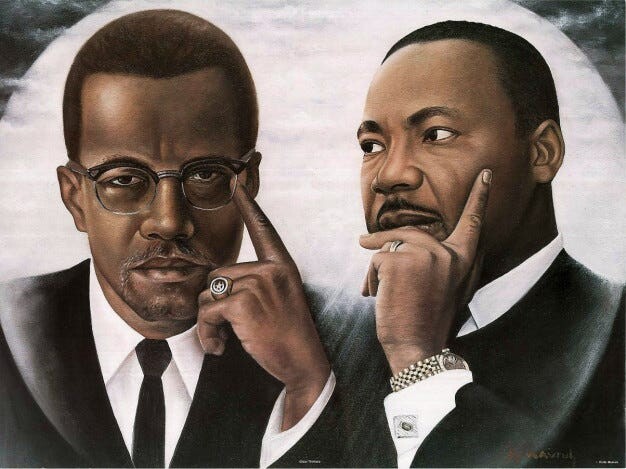this post was submitted on 12 Jul 2023
0 points (NaN% liked)
blackmastodon group
0 readers
1 users here now
I'm a group about blackmastodon. Follow me to get all the group posts. Tag me to share with the group. Create other groups by searching for or tagging @yourGroupName@a.gup.pe
founded 2 years ago
you are viewing a single comment's thread
view the rest of the comments
view the rest of the comments

In response to Malcolm X's critique of nonviolent civil disobedience, King maintained that nonviolence was both a moral and political strategy. He believed Black people should not succumb to the idea of becoming oppressors themselves. Given that Black people were a minority in the United States, engaging in an armed conflict would result in overwhelming force being used against them.
21/
#BlackMastodon #Histodons #History #StillWeRise #CivilRights
For his part, Malcolm X publicly denounced Martin Luther King many times, calling the preacher a modern-day Uncle Tom stating that “B y teaching them to love their enemy, or pray for those who use them spitefully, today Martin Luther King is just a 20th century or modern Uncle Tom, or a religious Uncle Tom, who is doing the same thing today, to keep Negroes defenseless in the face of an attack.”
22/
#BlackMastodon #Histodons #History #StillWeRise #CivilRights
I
In a speech in 1963, King responded to Malcolm X's labeling him an Uncle Tom by asserting that nonviolence was a weapon of strength. He viewed nonviolence as a powerful and courageous approach, capable of transforming America against its will.
23/
#BlackMastodon #Histodons #History #StillWeRise #CivilRights
Peniel Joseph, the historian, suggests that Malcolm X served as the prosecuting attorney for Black America, accusing white America of crimes against Black humanity that stretched back to racial slavery. In contrast, King acted as the defense attorney for Black America, but he defended both sides of the color line.
24/
#BlackMastodon #Histodons #History #StillWeRise #CivilRights
King defended Black people to white people, conveying that Black people desired inclusion in the body politic and citizenship, not Black supremacy or revenge. Likewise, he defended white people to Black people, emphasizing the presence of many good white individuals who fought alongside the movement and contributed to the pursuit of Black citizenship.
25/
#BlackMastodon #Histodons #History #StillWeRise #CivilRights
In time, Malcolm X would become less confrontational with King and his philosophies, due in part to his growing estrangement with the Nation of Islam. Tensions grew when Malcolm X and the leader of the Nation of Islam, Elijah Muhammed, differed on the Nation’s response to a shooting of a Nation member by the Los Angeles Police Department in 1962; Malcolm X demanded action while Muhammed advocated caution and patience.
26/
#BlackMastodon #Histodons #History #StillWeRise #CivilRights
The disagreement came to a head the following year in 1963 when it was revealed that Muhammed had been carrying on extra-marital affairs – a serious violation of the Nation of Islam’s strict teachings. Dismayed by Muhammed’s hypocrisy and realizing the Nation’s limitations due to its stringent doctrine, Malcolm X broke with the movement in 1964.
27/
#BlackMastodon #Histodons #History #StillWeRise #CivilRights
After Malcolm X broke ties with the separatist Muslim movement, he began to speak more reverently of the viewpoints of Martin Luther King Jr. He publicly acknowledged, "Dr. King wants the same thing I want - freedom!"
28/
#BlackMastodon #Histodons #History #StillWeRise #CivilRights
This new perspective prompted Malcolm X to arrange a meeting with King, but the meeting never happened. It was scheduled for Tuesday, February 24, 1965 but two days earlier Malcolm X was assassinated by Nation of Islam members. In a letter to Malcolm X’s wife following his assassination, King acknowledged their differing philosophies and approaches.
29/
#BlackMastodon #Histodons #History #StillWeRise #CivilRights
The roles of Martin Luther King and Malcolm X intertwined in a captivating dance. However, after Malcolm X's assassination, a significant irony and transformation occurred: King assumed the role of Black America's prosecuting attorney.
30/
#BlackMastodon #Histodons #History #StillWeRise #CivilRights
The visions of Malcolm X and Martin Luther King converged following Malcolm X's assassination. King experienced a "mountaintop moment" and realized that he needed to return to the valley. The Selma to Montgomery march became a crucial event, solidifying King's conviction.
31./
#BlackMastodon #Histodons #History #StillWeRise #CivilRights
Despite the violent events of Bloody Sunday, where Alabama state troopers attacked nonviolent demonstrators on the Edmund Pettus Bridge, King remained resolute. President LBJ eventually acknowledged the protesters as American heroes, and the Selma to Montgomery demonstration attracted thousands, including allies like Rabbi Abraham Joshua Heschel.
32/
#BlackMastodon #Histodons #History #StillWeRise #CivilRights
In his final nationally televised speech, delivered on March 25, 1965, King addressed American democracy, racial justice, and the challenges ahead. By August 6, 1965, the Voting Rights Act had passed, but just days later, the Watts uprising erupted in Los Angeles. Following the Watts uprising, King and Malcolm X's perspectives began to converge.
33/
#BlackMastodon #Histodons #History #StillWeRise #CivilRights
While Malcolm X had criticized the March on Washington, King wrote an essay in 1965 expressing his intent to employ nonviolent civil disobedience as a peaceful means to paralyze cities and pursue justice beyond civil and voting rights acts.
34/
#BlackMastodon #Histodons #History #StillWeRise #CivilRights
Resources
https://youtu.be/h4PqLKWuwyU
https://americanexperience.si.edu/wp-content/uploads/2015/02/Voices-of-a-Generation-Malcolm-X-and-Martin-Luther-King-Jr.pdf
https://www.livescience.com/martin-luther-king-jr-and-malcolm-x-similarities.html
https://www.npr.org/2020/08/12/901632573/black-power-scholar-illustrates-how-mlk-and-malcolm-x-influenced-each-other
https://www.npr.org/2023/05/15/1175833143/mlk-martin-luther-king-jr-malcolm-x-quote-biography
https://www.biography.com/activists/martin-luther-king-jr-malcolm-x-meeting
https://lbj.utexas.edu/black-power-scholar-illustrates-how-mlk-and-malcolm-x-influenced-each-other
https://www.openculture.com/2020/06/imagining-the-martin-luther-king-and-malcolm-x-debate-that-never-happened.html
https://www.nps.gov/articles/000/learning-from-malcolm-x.htm
https://www.npr.org/sections/codeswitch/2019/02/20/691298594/the-power-of-martin-luther-king-jr-s-anger
35/
#BlackMastodon #Histodons #History #StillWeRise #CivilRights
Books
Goldman, Peter Louis. The Death and Life of Malcolm X. 2nd ed. University of Illinois Press, 1979.
Joseph, Peniel. The Sword and the Shield: The Revolutionary Lives of Malcolm X and Martin Luther King Jr. Basic Books, 2020.
Malcolm X with Haley, Alex. Autobiography of Malcolm X. 1965.
36/
#BlackMastodon #Histodons #History #StillWeRise #CivilRights
@Deglassco
Again Professor, thank you for the education and the time you spend doing this work.